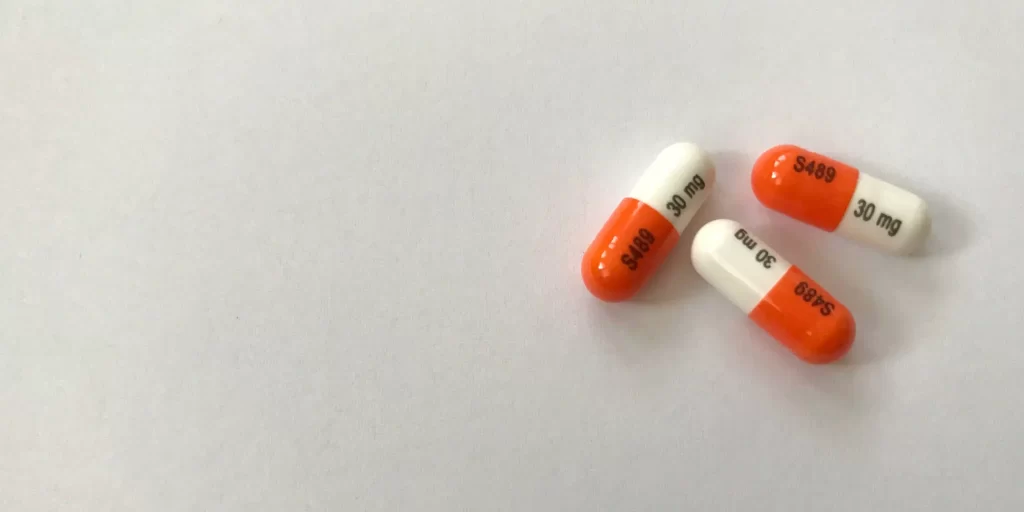Vyvanse Abuse: Symptoms, Signs & Side Effects

Vyvanse, the brand name for lisdexamfetamine, is a prescription central nervous system stimulant medication that is used to treat attention-deficit/hyperactivity disorder (ADHD) in adults and children older than six years old. The drug is also used to treat moderate to severe binge eating disorder in adults.
For people who have ADHD, Vyvanse is used to improve the ability to focus. High school and college students take “study drug” stimulants, including Vyvanse, without a prescription or an ADHD diagnosis in the hopes that it will increase their academic performance. Stimulant medications can provide a sense of motivation, focus and energy, which is often appealing to busy students. A 2016 research article that analyzed many published studies states that prescription stimulants can probably enhance a person’s cognitive ability to a small extent, but college students who misuse stimulants generally have lower grade point averages than their peers who do not misuse stimulants.
Negative effects of anxiety, mania, cardiac problems and psychosis can occur with Vyvanse use. These effects are dangerous in some cases, requiring urgent medical attention. People may also take Vyvanse to lose weight, achieve a high, stay awake for longer periods or decrease the feelings of drunkenness when used with alcohol.
In a report based on data from 2017, about 1.8 million people over the age of 12 reported misusing prescription stimulants. About 715,000 people 18 to 25 years old said they had misused a stimulant within the past month, and about 1 million people 26 years or older were currently misusing stimulants. Additionally, about 572,000 people over the age of 12 reported a stimulant use disorder in the prior year. A 2015 study found that about 17% of college students said they misused stimulant medications in general.
Vyvanse is a central nervous system (CNS) stimulant that is classified by the U.S. Drug Enforcement Administration as a Schedule II controlled substance, which means the drug has a legitimate medical use but can also be misused. Those who become addicted to Vyvanse will likely experience withdrawal when the stimulant leaves their system. Common Vyvanse withdrawal symptoms include extreme fatigue and depression.
Symptoms of Vyvanse Abuse
Vyvanse use can cause physical and psychological dependence, which can lead to Vyvanse abuse, in which a person is unable to stop using the drug despite negative consequences. Some of the most common symptoms of Vyvanse abuse are:
- Cravings for Vyvanse
- Lacking control over Vyvanse use
- Increased heart rate
- Increased respiratory rate
- Increased blood pressure
- Sweating
- Dilated pupils
- Hyperactivity and restlessness
- Insomnia
Due to individual differences from person to person, symptoms of Vyvanse abuse can vary. It is important to speak to a medical professional to receive a proper diagnosis and begin appropriate treatment.
Side Effects of Vyvanse Abuse
In addition to the various symptoms of Vyvanse abuse, there are also dangerous and sometimes deadly side effects of Vyvanse use, even when used for a medical condition under the supervision of a health care provider. Some common side effects of Vyvanse abuse include:
- Difficulty falling asleep, staying asleep and other sleep problems
- Weight loss
- Sweating
- Stomach pain
- Chest pain
- Shortness of breath
- Nausea
- Vomiting
- Feeling faint
- Dizziness
- Dry mouth
More severe side effects of Vyvanse abuse can occur in people who are addicted and include cardiac episodes, convulsions, psychosis, suicidal thoughts, seizures, hives, blurred vision, blue fingers and toes, heart attack, stroke or even sudden death.
Long-Term Effects of Vyvanse Abuse
People who abuse stimulant medications over long periods can suffer from serious, long-term effects. Chronic abuse of Vyvanse can cause irreversible changes that affect cognitive functions. Some effects of long-term stimulant use are:
- Mental health issues including depression, psychosis, anxiety, mania and manic episodes
- Increased risk of heart problems, including stroke and heart attacks
- Seizures
- Irregular heartbeat
- Malnourishment
- Irreversible damage to organs
Vyvanse Withdrawal Treatment in Washington
Treatment for Vyvanse use disorder often involves medical detox, cognitive behavioral therapy and aftercare. Appropriate care plans should be individualized to provide the best chance of success. There are several factors to consider when choosing a rehab facility to treat Vyvanse use disorder, including:
- Types of treatment options and approaches
- Environment and location
- Availability of follow-up care
- Personal comfort with facility and providers
If you or a loved one struggle with a substance use disorder, contact The Recovery Village Ridgefield today to speak with a representative about how addiction treatment can help. You deserve a healthier future, call today.
Sources
DailyMed. “Vyvanse (Lisdexamfetamine Capsules and Tablets).” January 19, 2018. Accessed June 30, 2019.
Weyandt, Lisa; et al. “Prescription Stimulant Medication Misuse: Where Are We and Where Do We Go From Here?” October 2016. Accessed June 30, 2019.
SAMHSA. “Key Substance Use and Mental Health Indicators in the United States: Results from the 2017 noational Survey on Drug Use and Health.” September 2018. Accessed June 30, 2019.
Benson, Kari; Floty, Kate; Humphreys, Kathryn; Lee, Steve. “Misuse of Stimulant Medication Among College Students: A Comprehensive Review and Meta-analysis.” March 2015. Accessed June 30, 2019.
WebMD. “Long Term Effects of ADHD Drugs.” March 18, 2019. Accessed June 30, 2019.
View Sources
DailyMed. “Vyvanse (Lisdexamfetamine Capsules and Tablets).” January 19, 2018. Accessed June 30, 2019.
Weyandt, Lisa; et al. “Prescription Stimulant Medication Misuse: Where Are We and Where Do We Go From Here?” October 2016. Accessed June 30, 2019.
SAMHSA. “Key Substance Use and Mental Health Indicators in the United States: Results from the 2017 noational Survey on Drug Use and Health.” September 2018. Accessed June 30, 2019.
Benson, Kari; Floty, Kate; Humphreys, Kathryn; Lee, Steve. “Misuse of Stimulant Medication Among College Students: A Comprehensive Review and Meta-analysis.” March 2015. Accessed June 30, 2019.
WebMD. “Long Term Effects of ADHD Drugs.” March 18, 2019. Accessed June 30, 2019.




